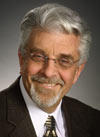 Wisconsin
Lawyer
Wisconsin
Lawyer
Vol. 81, No. 3, March
2008
Ethics
Part 1: A Dialog on the New Rules of Professional Conduct
In Part 1 of this two-part conversation, Dean Dietrich and Ralph Cagle
discuss some of the changes to Chapter 20, the Rules of Professional
Conduct for Wisconsin attorneys, including the impact of informed
consent and written agreements on the practice of law and lawyers'
potential exposure to malpractice claims.
by Ralph M. Cagle & Dean
R. Dietrich
On July 1, 2007, the Wisconsin Supreme Court adopted many changes to
Chapter
20, the Rules of Professional Conduct for Wisconsin attorneys. Dean
Dietrich,
chair of the State Bar Professional Ethics Committee, and Ralph Cagle, a
U.W.
Law School professor and former reporter to the committee, frequently
discuss
the changes and how they affect lawyers. Here is Part 1 of a two-part
dialog. Part
2 will continue in the April Wisconsin
Lawyer.
Dietrich: We've been discussing the change in the requirement
from
"consent after consultation" to "informed consent"
when asking for a client's
decision concerning representation. How do you think this new standard
of informed
consent will affect lawyers?
Cagle: It could be quite significant. Here's what I think has
happened. The
new rules up the ante on the information a lawyer must convey to a
client to
validly obtain the client's consent to a large number of actions,
including waiver of
a conflict of interest, revealing of confidential information, certain
fee
arrangements, joint enterprises, and probably most significantly,
agreement to
any settlement or plea agreement.

Ralph M. Cagle, U.W. 1974, is a professor at the U.W. Law
School.
The old standard of consent after
consultation is replaced by informed
consent. Now, over time, informed consent has taken on particular
shades of
meaning in other areas of activity, such as consent to medical treatment
or
procedures. The comments to the rules make clear that informed consent
requires a lawyer
to make a disclosure that includes: 1) the facts and circumstances
giving rise
to the situation requiring the client's consent; 2) any explanation
reasonably necessary to inform the client of the material advantages and
disadvantages
of the proposed course of conduct; and 3) a discussion of the client's
options
and alternatives. The comments also stated that the disclosure
needed for
clients who are not experienced in legal matters is greater. Most
clients aren't
experienced in legal matters.
I am not saying this is bad or the wrong standard for
communicating
with clients. In fact, I think it is the best practice. It certainly is
what I
teach my students to try to do. My concern is with making the best
practice the
minimum standard for which a lawyer is subject to being disciplined.
Dietrich: Are you predicting that this new standard will
result in more
lawyers being disciplined ?
Cagle: Don't know yet. Time will tell. But, I know that
alleged failures
in communication are one of the most frequent sources of disciplinary
complaints and imposed sanctions. Inadequate communication claims can be
difficult to
defend in part because they often are "he said-she said"
disputes where the
client and the lawyer have very different recollections of what was or
was not
communicated. We are just going to have to see how the Office of Lawyer
Regulation (OLR) applies this new standard. It can be a common sense and
practical
application or it can be enforced with biblical literalism. The latter
would be
problematic in my view.
Dietrich: Will this affect lawyers' malpractice exposure?
Cagle: Well, malpractice is a departure from the standard of
care exercised
by similarly situated lawyers. The new rule does not automatically
change the
way lawyers secure their clients' consent to undertake certain actions.
But, a
small change was made to the preamble to the rules that makes it clear,
or
clearer depending on your viewpoint, that a violation of the rules can
be evidence of
a failure to meet the applicable standard of conduct. I suspect that we
will
see some divided opinions about what that all means in this context.
Over
time, changes to the Rules of Professional Conduct can change how
lawyers do
certain things, and sometimes what once was a best practice becomes the
standard way
of doing something.

Dean R. Dietrich, Marquette 1977, of Ruder Ware, Wausau, is
chair of the State Bar Professional Ethics Committee.
Dietrich: The changes to SCR 20:1.5 require a Wisconsin lawyer
to send a
written communication to a client about the scope of representation,
fees, and
costs related to the representation. Does this new rule make sense?
Cagle: I think on balance it's a beneficial change for clients
and lawyers.
Too many grievances, lawsuits, fee disputes, and other misfortunes arise
out
of misunderstandings or mismatched expectations at the outset of the
relationship. Having the basis of the fee and the scope of the retainer
clarified by a
writing should mitigate many of those problems. A writing forces us to
be more
disciplined and deliberate in addressing these issues. Clients gain a
more
transparent lawyer-client relationship and maybe a little more control
over the form
of that relationship. For lawyers, I think this change should reduce the
incidence of fee disputes, grievances, and malpractice claims.
Dietrich: But won't lawyers now be subject to discipline just
because their
fee arrangements are not in writing?
Cagle: I doubt we will see public discipline being imposed
just for not
having a writing if the proof is that the fee arrangement was
communicated orally
and was understood by the client. The absence of a writing in that case
could
be seen as a bit of a technical violation. That has been my experience
of how
the OLR generally has enforced the writing requirement of conflict of
interest
waivers. But, the prevailing practice and the requirement is a writing.
I
strongly urge lawyers to do that.
It is important to remember that the only writing required is a
notice.
There is no requirement of a written fee agreement, though many lawyers
find
written fee agreements are a good practice. The State Bar of Wisconsin
has several
form notices online that lawyers can look to in creating a notice that
complies
with the rules. From the front page on WisBar.org, just click on the
shortcut
"Rules of Professional Conduct" to access the sample forms.
Dietrich: There have been a lot of seminars about the rule
changes. Is
there one particular rule change that lawyers may not be aware of but
should be?
Cagle: Picking one is a hard assignment. Beyond informed
consent, which we
have talked about, I think lawyers certainly should be aware of the new
definition
of misrepresentation that the OLR proposed to the court and the
court
adopted. Misrepresentation is now defined as "communication of an
untruth, either
knowingly or with reckless disregard, whether by statement or omission,
which
if accepted would lead another to believe a condition exists that does
not
actually exist."
It seems to say that I can make a misrepresentation even though
I didn't
know what I said was untrue and even if I didn't say anything in the
face of
someone else misunderstanding something. Lawyers recognize and honor
their duty to
be honest and truthful in what they represent to others, but they also
have
duties of confidentiality and zealous representation of their clients,
and they are
not mind readers. I'm not sure I have a very clear idea what that
definition
means in a lot of scenarios.
Dietrich: In what settings can this arise?
Cagle: Misrepresentation, along with dishonesty, fraud, and
deceit, are
prohibited by Rule 8.4(c). The rule applies to statements or omissions
made in
court; in any pretrial setting; in representing clients outside of
court, such as
negotiating the sale of a business; and in activities where lawyers are
not
representing someone, such as in a lawyer's private business
transactions,
public reporting such as tax reporting, and in private behavior. It is
one of
those very few rules that can subject lawyers to professional discipline
for
behavior that occurs outside their professional activities, so it adds
to my
anxiety about this expansive definition.
Dietrich: These rule changes give us a lot to consider.
Cagle: Yes. We'll continue our conversation next month.
The Dialog Continues in April …
In Part 2 of "A Dialog on the Rules of Professional Conduct for
Wisconsin
Attorneys," the authors discuss how breaching the rules may affect
legal
malpractice claims, significant changes to the trust account rules,
duties owed
to prospective clients, client confidentiality and conflict issues, and
how
the rules affect cross-border practice.
Wisconsin
Lawyer
